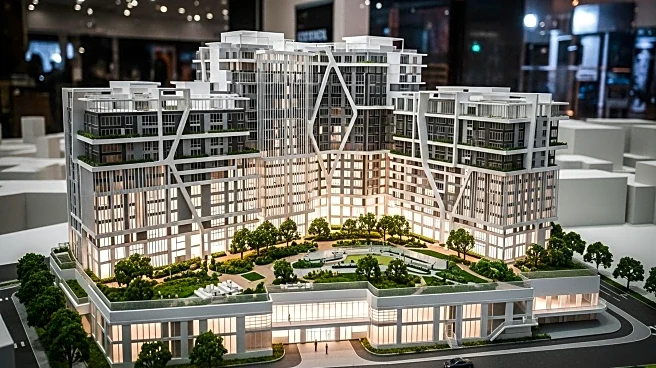What's Happening?
Hacin, an interdisciplinary architecture and design studio based in Boston's South End, is focusing on design strategies to address the housing affordability crisis in urban areas. According to a 2024 Pioneer Institute study, the number of households in Greater Boston increased by 10.7% from 2010 to 2020, while housing units rose only by 7.9%. Hacin emphasizes the importance of integrating new construction into existing neighborhoods by understanding neighborhood scale, recognizing local character, and creating livable spaces. The firm aims to create compelling designs that resonate with meaning and clarity of intent, contributing to the fabric of identity in neighborhoods.
Why It's Important?
The housing affordability crisis in Boston is a pressing issue, with demand for housing outpacing supply. Hacin's approach to multifamily housing design is significant as it seeks to provide solutions that are not only functional but also enhance community integration and livability. By focusing on design elements that respect local character and provide a sense of community, Hacin's strategies could lead to more sustainable urban development. This approach may benefit future residents by offering attractive and meaningful living spaces, potentially easing the housing shortage and improving quality of life in Boston.
What's Next?
Hacin's design strategies could influence future urban development projects in Boston and beyond. As the firm continues to integrate new construction into existing neighborhoods, it may set a precedent for other architecture and design studios to follow. Stakeholders such as city planners, developers, and community leaders might consider adopting similar strategies to address housing shortages in other urban areas. The ongoing evolution of Boston's neighborhoods could see more projects that prioritize community integration and livability, potentially leading to a more balanced housing market.
Beyond the Headlines
The ethical dimension of Hacin's approach lies in its commitment to creating homes that respect and enhance the existing community fabric. By prioritizing meaningful design responses, the firm addresses not only the physical aspects of housing but also the cultural and social implications of urban development. This approach could lead to long-term shifts in how cities address housing crises, emphasizing the importance of community-focused design in urban planning.









